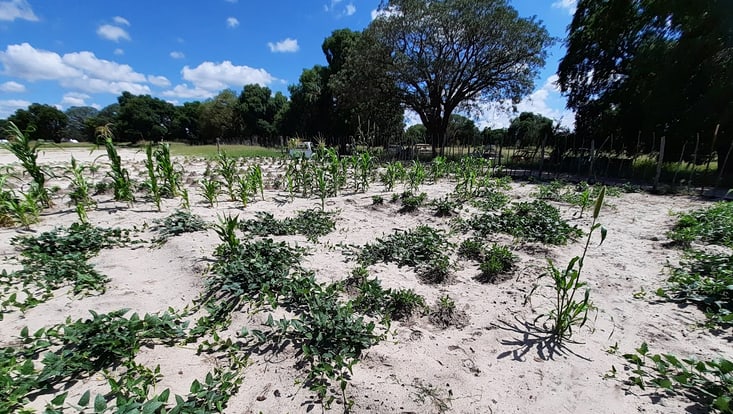Cowpeas in NamibiaBetter harvest despite climate change – why farmers hesitate
21 May 2025, by Stephanie Janssen

Photo: UHH/CLICCS/K. Jantke
What can small farms in Namibia do to combat climate change? The cowpea, for example. A CLICCS research project has already established this in field trials. The legume is drought-resistant and improves the fertility of the soil. Ideally, a simple process could achieve up to twice as high harvests, three co-benefits. But farmers are hesitant.
So, better yields are possible, but are they plausible? Specifically, would smallholder farmers be prepared to grow more cowpeas in the future than they do now to protect themselves against climate change? A new study shows that households are interested. But only half would change their cultivation. In interviews with 90 farmers from 30 villages in northern Namibia, the CLICCS-C2 team and scientists from the Namibia University of Science and Technology found that harvesting is more cumbersome than, for example, maize, which is popular locally.
“We want to develop adaptation measures that work,” says Dr. Kerstin Jantke, environmental scientist and co-author of the study. Surveys and discussions with people are a fundamental building block for this. After all, life circumstances often play a decisive role in whether people support and implement a change." In the specific case, the interviewees described how the cowpea pods grow much lower to the ground than those of maize and only contain a handful of beans at a time, so harvesting by hand takes more time and effort overall.
Cowpeas belong to the legume family, a type of legume that is beneficial for cultivation in Namibia. Like beans, lentils, chickpeas, and peas, they can bind nitrogen directly from the air and use it as a nutrient. Maize, on the other hand, requires additional fertilizer. Growing more legumes also increases the fertility of the soil, which benefits other crops.
Can the cowpea still be a success in hot and dry regions? “People want easily accessible and accurate information on growing and handling the plants,” says Jantke. She knows from other research projects that this increases the likelihood that modified cultivation methods will be accepted.
Article:
Rasche L, Katjana J, Jantke K, Uchezuba D, Schneider UA (2025): Exploring the Plausibility of Inoculated Cowpeas as a Climate Adaptation Strategy for Namibian Smallholder Farmers; Sustainability; https://doi.org/10.3390/su17094041
The project was funded by CLICCS and as part of the BMBF project SUSTAIN and the DAAD.


